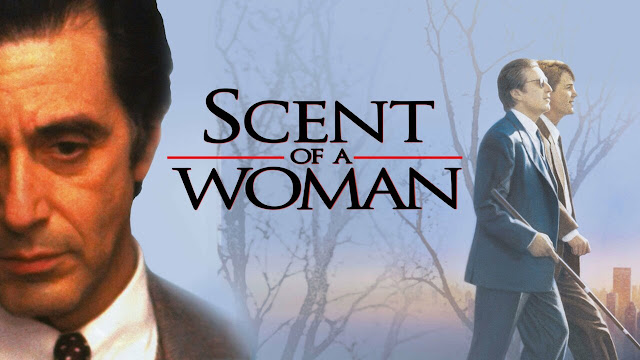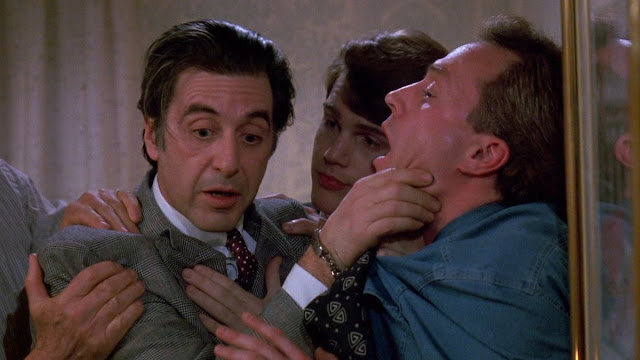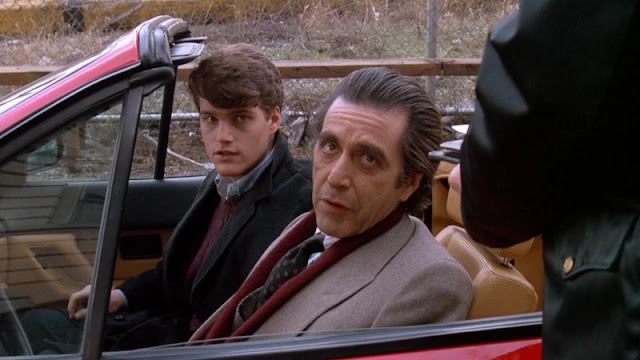I have always heard bad things about Scent of a Woman. Growing up, it was a popular film for people to dog on as if it was an Oscar-nominated film that didn’t deserve that distinction. On top of being a Best Picture nomination, it also won Al Pacino his Oscar when three previous Godfather films failed to do so. It is perhaps this reason that people unjustifiably spew vitriol at Scent of a Woman, because it succeeded where films that are universally considered to be better failed. I’m just speculating here because as I watched this film, I felt that Al Pacino was absolutely spot-on. He is giving a performance, and there are times when that performance is big in a way that only Pacino can get away with, but I felt that performance fit for this character, and it never took me out of the film. So watching it again, this morning, I was struck again at just how good Pacino is in it and how Chris O’Donnell is outclassed scene for scene. He’s good, but Pacino is on a whole other level altogether.
What we have here are two basic stories that barely have anything to do with each other, until they finally fully intermix in the finale. The first involves a prank played on Mr. Trask (James Rebhorn), a high-ranking official at Baird, an exclusive New England preparatory school. Two students, Charlie Simms (Chris O’Donnell) and George Willis Jr. (Philip Seymour Hoffman), witness the perpetrators setting up the prank the night before, but neither will testify against their fellow students. George insists that they remain silent, and that the lack of proof will protect them.
Meanwhile, this being Thanksgiving weekend, Charles, who is relying on a scholarship to afford school, is looking for short-term employment over the long weekend to help pay for necessities. He answers an ad for a weekend caretaker while a family is out of town for the holidays. What he is expecting and what he gets are two separate things altogether. Upon arrival, he discovers the person he is supposed to care for is retired Vietnam veteran Lieutenant Colonel Frank Slade (Al Pacino), a man who was blinded through an act of carelessness and is now embittered and an alcoholic. The family assures Charles that Slade’s bark is worse than his bite, and he agrees to take the job.
What unfolds over the long weekend, though, is far from uneventful. The two end up taking a trip to New York City; visit some of Slade’s family, none of whom are happy to see him; eat at fancy restaurants, and spend a lot of Slade’s money. All of this is leading up to Slade’s ultimate plan: to enjoy one last weekend before ending his life on his own terms, putting himself out of the self-inflicted hell he has landed himself into. Meanwhile, back at the school, Mr. Trask is organizing a disciplinarian hearing with the goal of either getting Charles and George to name names or, since George has connections and therefore cannot be too severely punished, having Charles expelled for refusing to cooperate.
Part of what makes Scent of a Woman such a great film is the chemistry between the two leads. Chris O’Donnell was just two years out from his acting debut in Men Don’t Leave and had not quite established his brand of acting by this point. That would change in 1993 with The Three Musketeers and, two years later when he debuted as Robin in Batman Forever. His boyish good looks would serve him well, eventually landing him a long-term role on NCIS: LA. But here he is still relatively inexperienced, and it occasionally shows. That’s not to say he is bad in this. One needs only watch the confrontation between him and Pacino when Pacino has loaded his gun and is ready to finally call it a day. The fear in Charles’ eyes feels real, and the emotions are coming through clear as day. This is the scene that won Al Pacino the Oscar and came close to getting O’Donnell a nomination, too.
But like I mentioned above, Pacino is acting circles around the inexperienced O’Donnell. There was never a time when I questioned that Slade was blind. I have seen my fair share of actors portraying disabilities, including Audrey Hepburn’s memorable turn in Wait Until Dark. Some are obviously better than others. Pacino really grasps the mannerisms of the sightless, how they interact with the environment, both the familiar and the unfamiliar. He knows how to make it appear like he is looking at you, pretending he can see when he obviously cannot. This makes for a humorous moment between him and a police officer after being pulled over for speeding in a Ferrari. He also accurately portrays the anger felt when Charles, in his ignorance, tries to grab his arm to guide him. So much of this portrayal rings true with experiences I have had with blind people I’ve known. They are not helpless and should only be grabbed if invited or there is imminent danger.
Colonel Slade has a lot to be depressed and angry about. By all accounts, he was a real prick long before he sustained his injuries and lost his sight. The story about what happened to his eyes is told matter-of-factly, but the details may or may not be apocryphal. Either way, he has a lot of anger inside him, and he is not shy about taking it out on the people around him, even Charles. When the two first meet, it is hostile. Slade has elected not to accompany his family on their Thanksgiving vacation, and we get the feeling that they don’t want him to go, either. He would probably be fine on his own, but they’re not going to leave him alone for that long. We get a sense that he doesn’t think too highly of Charles at first, but that will change.
The biggest sign of that change comes when Charles stands up to him over the shortening of his name. Slade refers to him initially as Chuck, which Charles informs him he doesn’t like. Throughout the course of the film, nearly everyone else will treat Charles the same way, including his classmates who call him Chaz, Chuck, or Charlie. When an antagonistic family member of Slade keeps using the name Chuck, Slade attacks him suddenly, defending Charles even though he, himself, shows the same disrespect to one of the women at the table by calling her by the completely incorrect name. It shows that he may be hypocritical, but he will defend those he respects, at least a little. This quirk in his character will come back in a very important way in the finale.
Topics like depression and suicide are tough ones for me to watch. I grew up feeling depressed all through my high school years, and while I never seriously contemplated suicide, I did think about it more than a few times. I fortunately grew out of it, but those times still haunt me to this day. Seeing others struggling with it far more than I ever did hits me hard. Films like A Man Called Otto— or its superior Swedish original release, A Man Called Ove— really drive this home to me. I even wrote a novel and several short stories about twenty years ago that dealt with the subject. My personal experiences with suicide and my own writings on the subject are perhaps the biggest reason Scent of a Woman works so well for me.
The story of Charles and Slade as they both feel like their lives are spiraling downward will never not move me. Perhaps this is the reason why the ending falls flat. I never cared much about the whole code of honor plot line, and I felt that Mr. Trask would have a hard time expelling Charles from Baird simply because he wouldn’t tell on a fellow student. After all, there was absolutely no proof that Charles had even seen who the culprits were and could probably successfully sue the school over such an expulsion. It does allow Pacino one last scenery-chewing moment as he passes pronouncements about the importance of loyalty and honor. It just feels like this whole plot point is superfluous.
Scent of a Woman may not be a masterpiece, but it is some darn good cinema. For every over-the-top “Hoo-ah” from Pacino, there are dozens of other moments where you can see the inner struggle going on behind that outward façade. I agree, he should have won the Oscar for The Godfather, both the original and the sequel, but I don’t agree that his win here is a consolation prize. It is earned. This is an incredible performance and deserves to be rewarded. This film is an emotional roller coaster that takes you from the highs of a blind man racing a sports car through the streets of New York City to the lows of a young man witnessing the emotional breakdown of an older man who feels that his life is over and must come to an end. Any film that can make me feel as much as this one does is well worth the accolades.
Academy Award Nominations:
Best Picture: Martin Brest
Best Director: Martin Brest
Best Actor: Al Pacino (won)
Best Screenplay - Based on Material Previously Produced or Published: Bo Goldman
____________________________________________________
Release Date: January 8, 1993
Running Time: 156 Minutes
Rated R
Starring: Al Pacino and Chris O’Donnell
Directed By: Martin Brest










Comments
Post a Comment